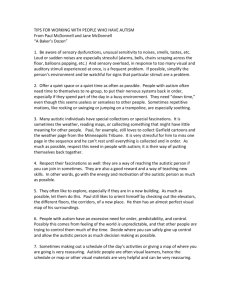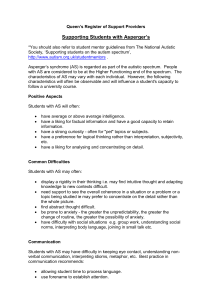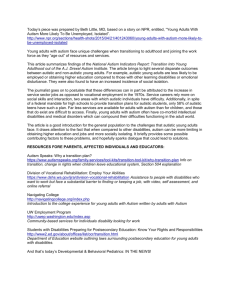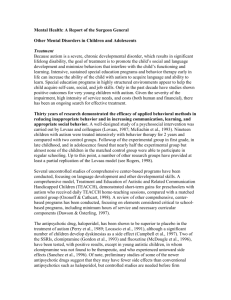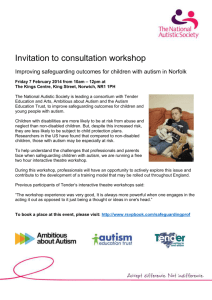Transcript - The Network
advertisement
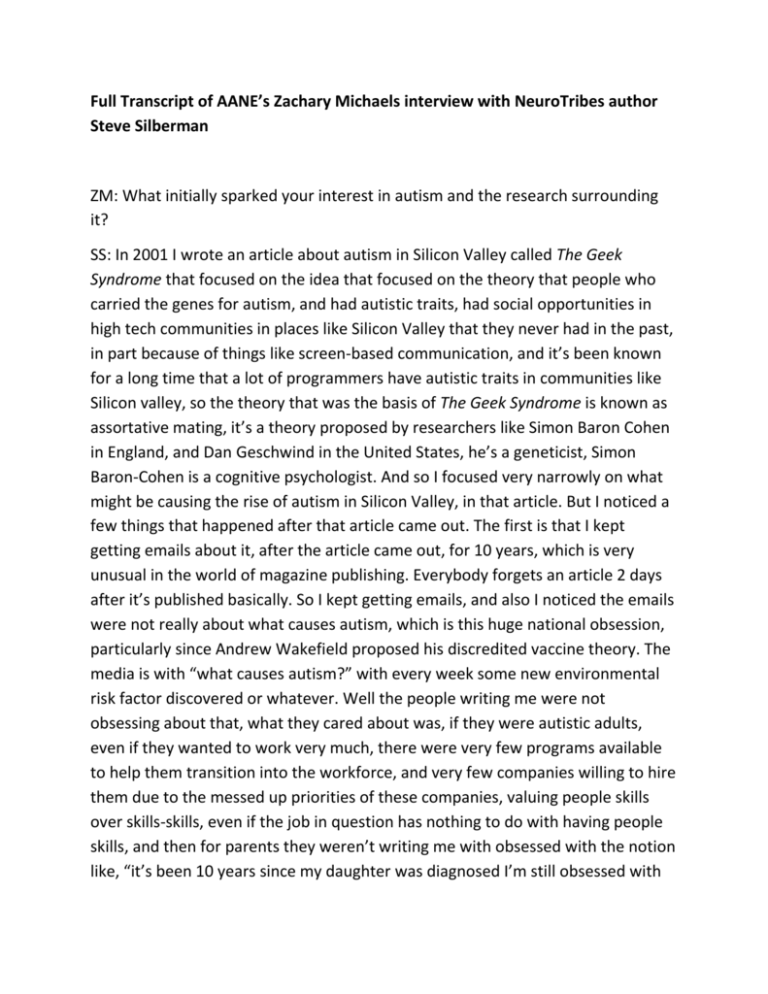
Full Transcript of AANE’s Zachary Michaels interview with NeuroTribes author Steve Silberman ZM: What initially sparked your interest in autism and the research surrounding it? SS: In 2001 I wrote an article about autism in Silicon Valley called The Geek Syndrome that focused on the idea that focused on the theory that people who carried the genes for autism, and had autistic traits, had social opportunities in high tech communities in places like Silicon Valley that they never had in the past, in part because of things like screen-based communication, and it’s been known for a long time that a lot of programmers have autistic traits in communities like Silicon valley, so the theory that was the basis of The Geek Syndrome is known as assortative mating, it’s a theory proposed by researchers like Simon Baron Cohen in England, and Dan Geschwind in the United States, he’s a geneticist, Simon Baron-Cohen is a cognitive psychologist. And so I focused very narrowly on what might be causing the rise of autism in Silicon Valley, in that article. But I noticed a few things that happened after that article came out. The first is that I kept getting emails about it, after the article came out, for 10 years, which is very unusual in the world of magazine publishing. Everybody forgets an article 2 days after it’s published basically. So I kept getting emails, and also I noticed the emails were not really about what causes autism, which is this huge national obsession, particularly since Andrew Wakefield proposed his discredited vaccine theory. The media is with “what causes autism?” with every week some new environmental risk factor discovered or whatever. Well the people writing me were not obsessing about that, what they cared about was, if they were autistic adults, even if they wanted to work very much, there were very few programs available to help them transition into the workforce, and very few companies willing to hire them due to the messed up priorities of these companies, valuing people skills over skills-skills, even if the job in question has nothing to do with having people skills, and then for parents they weren’t writing me with obsessed with the notion like, “it’s been 10 years since my daughter was diagnosed I’m still obsessed with the notion that something caused her autism,” no it was they were instead worried about what would become of their daughter, once she aged out of services once she graduated high school. So what I discovered was that the national agenda was centered around potential causes and cures for autism, but what families were really struggling with had nothing to do with causes and cures. They were struggling with a lack of services and supports. And autistic people themselves were dealing with bullying, being excluded from the job market, generally feeling like they were stigmatized in society, and feeling like they were further stigmatized by organizations that kept insisting that autism was an epidemic. Autism Speaks used the term epidemic in its press materials over and over, up until fairly recently, and one of the problems with the word epidemicautism organizations love that word because it attracts attention “Oh my God it’s an epidemic!” you know, but one of the problems is that it renders previous generations of autistic adults invisible, because if it’s an epidemic now that means it was not very common before… anyways that’s a lie. So I started to think, someone’s got to figure out what the main dynamics feeding into the rise of diagnosis is. And so I realized pretty quickly that it would take years of research to do that. So that’s what I did. ZM: So your initial goal was to find the reason for the cause in diagnosis? SS: Yes, and also to look at autism outside the medical context, to look at it in a social and historical context because, as we all know, there are thousands of books about autism out there, but they usually fall into three categories, first there are autobiographies by autistic adults, which are great because at least they’re accurate, generally. There are sort of critical books looking at autism as a medical problem, and there kind of self-help books for parents. So I was amazed that nobody had ever done -- actually that’s a misstatement, there was one book, called A History of Autism written by Adam Feinstein, and it’s a really excellent book, but alas it costs like 70 dollars. So many of the people who would most need to read a book like that, might not read Adam’s book because it’s expensive and it was positioned as an academic book. So I wanted to write a book that would be as compelling as a medical mystery or a page turner, so people literally wouldn’t put it down, but would be scientifically accurate and historically accurate. So that’s what I tried to do. ZM: So did you have a target audience in mind when you were writing this book? Because it’s not really an academic book, and it’s not really a self-help book for parents, so what target audience, if you had one, were you thinking of when you were writing it? SS: It was a very, very broad audience that I had in mind. It was everyone from autistic people themselves, because I know how tired they are reading books designed to tell them how many deficits and impairments they have, it’s depressing. I also wanted parents to read it, because parents are so terrified by the notion that vaccines cause autism, so I thought it was very, very important, as real childhood epidemics like measles and mumps are coming back because of parent’s refusing to vaccinate their children, I thought it was important for parents to read it. I thought it was important for clinicians to read it. Believe it or not even people that have been in the field for 30 years don’t know the stuff that’s in my book, because I discovered a lot of things that people had ever talked about before. There have been suspicions, people have suspected maybe there was some connection between Kanner and Asperger, but nobody knew what it was until I found it. I also wanted people with absolutely no personal connection to autism to read it, because autism is in the news all the time, and people are constantly coming up to me and saying “So it’s the vaccines right?” “No it’s not the vaccines.” And these are not necessarily people with autistic kids or autistic relatives necessarily, they just read the news. So I also wanted to reach a general science readership. And it was very ambitious, but it seems to have worked. Zachary, do you know that the book just became a New York Times best seller? ZM: No, how long has it been out? I thought it just came outSS: A week! ZM: Yeah. So, congratulations! SS: Thank you buddy. ZM: So you’ve talked a bit about vaccines already, but I think your book touches on a lot of possible misconceptions and stereotypes, so I was wondering what misconceptions you think NeuroTribes might alleviate or challenge in some way. SS: One of the main… well there’s so many misconceptions about autistic people, and the way that I sort of got beyond the misconceptions is, one of the first things I did, was go to Autreat, which is an autistic retreat designed for autistic people by autistic people, so as an NT I was very much in the minority at Autreat, and that was great. For one thing I got to see autistic people just hanging out, instead of seeing some kid in a clinic with his parent’s or whatever, I got to see autistic people just kind of being themselves with each other, and that was great. And the other thing is that I got to see what it was like to be a neurological minority for the first time in my life, and that was also great, it was very instructive. I remember when I went there my head was filled with all these misconceptions. Like autistic people suffer from problems with empathy. Well it was pretty obvious that most autistic people are in fact intensely empathic but that they might have problems taking another person’s perspective, figuring out where another person is coming from, but it’s not that they lack empathy or something like that. They are obviously very concerned about how other people feel about them, and often suffer from other people’s bad opinions. It’s not that they don’t care or can’t feel what the other person thinks about them. Slightly less dangerous, but equally prevalent, is this misconception that autistic people don’t get humor. Autistic people are hilarious, they have very dry wit, and they appreciate certain forms of sarcasm and irony almost better than NTs. It’s almost like when I first went to Finland, I first thought, “Oh my God, these people are completely humorless, they never laugh.” But I figured out after a couple days that they were actually hilarious, and making witty comments all the time, they just didn’t do it in this really blatant American way. And the same thing was true of the autistic community in Autreat, which is that they were constantly making jokes. For instance, when Ari Ne’eman was introduced, he had just been appointed to the National Council On Disabilities by Obama, he was introduced with a big round of flappause, which is people flapping their hands instead of clapping, and then a girl in the back yelled out “We’d love you Ari, if we were capable of feeling such an emotion!” (laughs) which was hilarious. So autistic people not only have a keen sense of irony, they have a keen sense of irony as it applies to misconceptions about them. Another thing I saw at Autreat was, when I first got there, I saw a kid who appeared to be having a meltdown, he was primarily non-verbal, he was screaming, he was running up and down the halls, dragging his mother down the hall, and I thought “Oh my God, this is really heavy, this is severe autism.” And I later found out that he was doing it because he was extremely happy, because he was going to be seeing his autistic buddies again and Autreat. So when NTs look at Autistic people they often see their own prejudices instead of the people in front of their eyes. I learned that by going to Autreat. So the most dangerous misconception about autism is that there were no autistic adults in the past, or that autism used to rare in the past and now it’s common, the dangerous thing about that is it renders previous generations of autistic people invisible and that creates a bad federal research agenda, inadequate allocation of resources for families and autistic people, and one of the reasons that autistic people in the past are invisible, is because if they were profoundly impaired they were institutionalized, which is one of the great injustices of the 20th century that I tried to bring to light in my book. So now when people like Age of Autism say it used to be rare, they’re actually committing a double injustice against autistic people. ZM: So in your recent interview in NPR you talked about how you refrain from using the terms “high functioning” or “low functioning.” It was interesting because I didn’t really notice it while reading the book, but after I heard that it was really obvious in it’s absence. So I was wondering if you could elaborate on your logic behind abstaining from those terms. SS: Well I know the terms high functioning and low functioning are very widely used, and that some parents and clinicians find them useful, but I avoid using them because I think they’re misleading. I think so called “high functioning” people are often struggling more than is obvious from their outward appearance, like they may be able to strive hard to fit into a neurotypical setting, but it may be taking a toll in anxiety and depression that the NTs often won’t notice. And I think that “low functioning” people often have talents and aptitudes and abilities that are not obvious, because they can’t talk, or maybe they are stimming a lot or something. So I think people underestimate “low functioning” people, and underestimate the struggles of “high functioning people.” I also just think it’s insulting. I mean, who wants to be called “low functioning?” I have friends who are non-verbal, some of them are functioning very well, they’re just non-verbal. Those terms are just so loaded with social assumptions. So even though I would admit under duress, that some autistic people can meet the challenges of daily life more easily than others, or some may require more support, that’s obvious, but those terms are used, unquestioningly, way too much. ZM: You mentioned Autism Speaks earlier, and you recently had an op-ed in the LA Times criticizing it, and generally talking about organizations and funding issues. What do you think autism related organizations might be focusing too much on or not enough on? What kind of change would you like to see? SS: Well Autism Speaks is spending way too much on research for discovering the cause of autism. I’m not saying we shouldn’t be doing research to relieve the suffering of autistic people, for instance a lot of autistic people have seizures, seizures can be deadly, we should definitely be putting money into- I’m not against science, I’m a science writer, I’m pro-science. Many of my friends are in autism science, so I’m not against genetic research, it’s just that, why aren’t we doing more to help autistic people not have potentially fatal seizures, while we’re spending 50 million dollars to the Beijing Genomics Institute to discover more candidate genes for autism when we’ve already found 600 to a thousand, and we’re still no closer to “preventing” autism. And I also think that the idea that we could prevent autism, through prenatal testing and selective abortion, has potentially very grave consequences for our society, because one thing that is clear is that autism is sort of a fellow traveler in the human gene pool, with certain forms of intelligence and aptitude. Temple Grandin has warned for a long time what could happen to the human race if we attempt to remove autism from the gene pool, as the Nazis did, and I agree with her. Here are three things I think autism organizations should be focusing on. Firstly, improving quality of life for autistic people. Another is research into women on the spectrum. We still know so little, this assumption is repeated so often, “4 times as many cases of autism in boys as among girls” that’s not a good fact, we don’t know really. Autism presents so differently in women, so it may be true, there may be some interesting thing going on with hormones or a protective effect in the genes or something, but we don’t know really. We’re still at the preliminary stages of research on autistic women. Another is autism in minority communities, and in impoverished communities, who have been ignored for decades. In fact one of the things I regret about my book actually, is that I didn’t have more time to cover in minority communities, and that’s in part because most of my book is about history, and so few people with autism of color were diagnosed in previous generations that there wasn’t really that much for me to work with. What used to happen, and I do talk about this in the book, is that people of color would be diagnosed with “mental retardation” instead of autism. So someday I would like to write more about autism in minority communities. So those are three areas of research that are starving for attention while we’re sifting through the human genome for another hundred candidate genes. Yes it’s interesting that we’ve found all these candidate genes, but does it really help people in their daily lives? I just want us to ask that question as a society. We’re so busy patting ourselves on the back “we’ve spent more than a billion dollars on autism research in the last 10 years!” Yeah, but on what? We still don’t know what the prevalence of autism among adults in America is. That famous 1 in 68 CDC figure is for school children. Why don’t we know what the prevalence of autism in America is? And in England someone asked that question and found lo and behold, the prevalence among adults was the same as among kids which suggests that the prevalence has not gone up at all, yet as a society we’ve been pretending that they are. ZM: So I had this question more towards the end, but I think you were talking about a related point, all, or almost all of NeuroTribes is kind of focused on autism as we understand it in the western world, and from that kind of perspective. I was wondering if you knew of any kind of research maybe medical anthropology, or any other field of academia that would broaden that perspective. SS: Yeah, absolutely. One of the books that was a model for mine was Roy Richard Grinker’s Unstrange Minds, that looked at how autism is thought about in other cultures and third world countries even, and I thought that was a fantastic book, in a sense I thought they didn’t have to write that book because he did such a great job, he’s an anthropologist, so Unstrange Minds is a brilliant book, very ahead of its time, and a must read for people interested in how autism is framed in different cultures. ZM: Okay. Yeah, your book is so definitive in a lot of ways, so I was wondering where someone could go from there… SS: Yeah, it’s a great book. Another-sorry I know you’re not asking me for my recommended books- but another book that just came out this month that I think is fantastic and ground breaking is called Uniquely Human by Barry Prizant. A lot of parents ask me “what books should I read?” and Uniquely Human is like the lessons of history that I wrote about in NeuroTribes but applied to raising autistic kids. So that’s another fantastic book that sort of completes the picture of viewing autistic people with respect, rather than as people with a medical problem that need to solved. ZM: So I have a few questions related to pop culture, because I really like how your book puts autism in a sociological context, I was a sociology major in college, so it was really interesting to me, and it’s not something that really comes up very much with autism. So you talked about the effects of the movie Rain Man on perceptions of autism, what would you say were some of the positives and negatives that film had, and maybe how has pop culture evolved or failed to evolve since…I guess that’s almost like a three part question… SS: No, it’s a great question, Rain Man was absolutely groundbreaking for it’s time because the diagnosis of autism had only recently been made available to adults in the United States, so what many people did not realize, looking back at that film, was seeing an autistic adult on the screen was a completely new experience, even for people who had been in the autism community for decades by that point. Very, very few people had seen any representation of autism in adulthood. So it was amazing, and it turned autism virtually overnight, from an obscure, allegedly rare, condition of childhood, into a subject that everyone was talking about. The number of magazine and newspaper articles on autism soared immediately after Rain Man. And on his tours to promote the film Dustin Hoffman would relate autism to everyone, he made it a universal concern, rather than this weird syndrome. So all respect to Rain Man. There are two problems with it. One is that one person cannot stand for an entire, invisible population. As we know autism is an incredibly broad spectrum. People with autism are more different from each other than neurotypical people are. So how could one man stand in for such broad and diverse population? The answer is he can’t. He’s an old white guy, that’s all he’s ever going to be, so he can’t stand in for a black autistic woman. There’s a limitation of Dustin Hoffman being a single person standing in for a whole diverse population. Another problem is that at the end of the film he goes back into the institution, and he is depicted as being unable to live on his own. As I talk about in NeuroTribes the great irony of that the real life model upon which the character od Raymond Babbit was based-people like Peter Guthrie and Mark Rimland- were not living in institutions because their parents refused to take the advice of the psychiatric establishment and put them there. So they were living on their own with their parents help. Peter Guthrie has worked at the Princeton University Library for decades now, Mark Rimland has never lived in an institution. In a sense Raymond Babbitt was doing worse than the real life autistics that inspired him, and that was something that the screenwriter Barry Marrow did not agree with. In Barry Marrow’s original script Raymond lived with his brother Charlie Babbitt at the end of the film. They lived happily ever after sort of. But Hollywood, and some of the autism experts who weighed in, said it would be better if he went back the institution. So that’s another problem. In a way it’s like the last gasp of the autistic people should live in institutions meme. ZM: It’s kind of a usual thing for a Hollywood movie to have a bleaker ending, and that be the inaccurate… SS: Yeah absolutely. ZM: So that’s how pop culture has viewed and portrayed autism, but that goes both ways, because you talk about how autistic people have contributed to popular culture, in particular science fiction, so I was wondering if you could talk about how popular culture has been influenced or how some aspect might be indebted to autism or autistic people. SS: Well the main character in the chapter of my book called Princes of the Air was an entrepreneur called Hugo Gernsback, who really popularized both ham radio and pulp science fiction, and his biographer, Gary Westfahl, believed that Hugo was on the spectrum, and if you look at his behavior, Hugo’s behavior was very eccentric, but he was very, very good at doing things that ended up benefiting autistic people in a million ways, building communities based on remote communication, so even if you were too shy to leave the house, or had problems with spoken language, you could talk to other to other ham radio operators or hams, using Morse code starting in the first decade of the 20th century. So ham radio became a refuge for – at that point we’re 80 years away from coming up with a diagnosis for autistic adults, so these early ham radio operators, who had no idea that there was a label for their condition, they just felt like social recluses or were perhaps weird to their peers, but suddenly there was this medium where they could A) become fascinated by electronics, which is something many autistic people seem to be interested in, taking elaborate machines apart, putting them back together, studying the subject very in depth, and almost as a side benefit in a way, you could communicate with other people that were like you. The first person to notice that autistic people were attracted to science fiction was Hans Asperger. Early on he talked about his patients’ obsession with rocket ships, and at first he had kind of a dismissive attitude towards this, he said “one can see in their fascination with rocket ships how divorced from daily reality autistic people’s interests really are.” Well 20 years later when the whole world is obsessed with rocket ships and autistic people were helping build them at NASA he changed his tune, and actually sort of apologized for the earlier remark. So it seems that Hugo Gernsback in the fiction that he published in his magazines, he had a whole empire of magazines, he basically pre-imagined the modern world in so many different ways, everything from television, which by the way, was a technology that debuted on one of Gernsback’s radio stations, to space flight, to the internet- Gernsback was talking about typewriting by wire back in the 1920s or something, and that’s basically the internet, typewriting by wire. He was imagining Skype in the 19-teens. He also worked with Nikola Tesla- a couple of the reviews of my book have said, “Silberman says Tesla is autistic.” I don’t know. I do say that Gernsback was probably autistic because I have it on higher authority from his biographer that he probably was, but I’m not about retro-diagnosing people willy-nilly, so I don’t know if Tesla was autistic. But one thing he wasn’t was neurotypical. He had a lot of autistic traits, and he was a frickin’ genius. So Gernsback and Tesla, neither of them neurotypical, imagined the modern world, which eventually came into being, it’s the world we’re all living in now. And Gersback’s magazines helped launch fandom in a big way. Science fiction fandom was the first modern fandom. And he did it by allowing readers to get in touch and form clubs because he thought it would be good for marketing. So there would be science fiction clubs, and they would be havens and sanctuaries for interesting geeks. Just like Ham radio had been. I know a lot of autistic people who are into various fandoms, it’s turned out to be that way ever since the beginning of fandoms which were created by someone who was probably autistic. ZM: So this question is pretty topical, and I honestly don’t know how many people apart from me would be interested in it, but Gernsback’s magazine Wonder Stories, you mention in your book, took a neutral stance on Hitler by publishing German translated stories, something along those lines, and that seems to be something that’s persisted in a way, not obviously in being neutral towards Hitler, but it seems to me that every part of pop culture that autistic people are particularly attracted to there seems to be this debate about whether or not it should be “apolitical” and there was this whole controversy with the Hugo Awards (interviewers note: The Hugo Awards are science fiction awards held in honor of Hugo Gernsback). So I was just wondering if you had any thoughts at all about whether genre fiction, and things related to science fiction, if they are best as pure escapism, or if by being apolitical it might be squandering an opportunity that autistic people have to become more connected to a world that they might be detached from? Does that question make sense? Do you have an interest in answering? SS: Well in fact you said it so well I don’t really have anything to add. (laughs) I actually think that’s a really astute question about genre fiction, but because I’m not really an expert on genre fiction I don’t really have anything to add, but I think that is a fantastic… I would love to go to weekend conference on that question. ZM: Yeah, I have opinions but I didn’t want to editorialize… SS: No no, it’s great, I just don’t like to talk about stuff where it’s just me kind of manufacturing an opinion so I would say that I don’t know enough to answer it intelligently, but boy did you ever ask it intelligently. ZM: (Laughs) That’s very fair… SS: Could I suggest a question that might be good? ZM: Sure. SS: Steve you are gay, do youZM: Actually that was kind of going to be the next question, I was just going down the list, and because we’ve touched on questions I was going to ask… so (now) I was going to ask do you think there is a movement that the neurodiversity movement has parallels to, or could learn from? And I was kind of thinking about the queer rights or LGBT rights movement. SS: Yeah, I don’t think it’s any accident that one of the founders of the autism rights movement Jim Sinclair, considers… I don’t know the right pronoun to use… it’s an invented pronoun, so I don’t want to say himself… gender neutral. ZM: I think you can say themselves and that will probably be politically correct. SS: Sure, I also don’t think it’s an accident that three of the best known writers on the subject of neurodiversity, me, Oliver Sacks-who didn’t really call it neurodiversity but was expressing a neurodiverse perspective-, and Andrew Solomon, author of Far From the Tree, are all gay. Or were gay, in the case of Sacks. I think we know what it’s like to be outside of society, and to be stigmatized by the medical profession, and to have our perceptions dismissed as expressions of pathology, and so I don’t want to overwork the gay=autistic metaphor, because it’s wrong and off-base in many ways. But I do think that gay people like myself, may have a perspective on being bullied, being stigmatized, being outside of society, that may be useful when looking at the evolution of the diagnosis of autism, and the emergence of the autism rights movement. And I find it very interesting, in fact fascinating, that so many young people on the spectrum identify themselves as either gender non-binary, or gender queer. I have an autistic nephew who is either trans or gender non-binary. Boy that is a really fruitful area of discourse and collective consideration. Is it that autistic people are immune to socialization thus free to experience their gender non-binaryness, or their gender-queerness, or is there something about autism that encourages people to be that way? I think that’s really interesting. That’s another area that we’re just at the beginning. But I’m really excited, I hear there’s an anthology of gender-queer autistic writing. I can’t wait to read it. ZM: So for my last question, you’ve just completed this book, it’s really extensive I believe it took 5 years to write… SS: Yes. ZM: Do you plan to continue to do work relating to autism? Or now that you’ve finally finished this book are you more interested in branching out and working on a different topic? SS: Well I am interested in continuing to write about autism for two reasons. There are many stories that were very generously offered to me by autistic people that I was not able to use in the book because of space consideration. The book had to be cut by 300 pages because who’s going to read an 800 page book? Already people are complaining “It’s a lengthy tome!” Yes, it’s a lengthy tome, I’m sorry, I tried to make it exciting. I think my editor was right when she said, “We could include these 300 pages, but then no one would read the book and it’s really important that they do.” So I have a lot of autism stories and I would like to tell them in some form. I don’t think I’m going to be writing another autism book though, because A) I think I should not be speaking about autism so much. I think autistic people should be speaking. I never lose sight of the fact that I’m an NT, with NT privilege, and furthermore white male NT privilege. At least (it is) not white male heterosexual NT privilege! (laughs). But I’m in a position of privilege, and I’m trying to use that privilege now to signal boost autistic voices, as I’ve been doing for some years now. But my time in the spotlight should, necessarily, be limited so autistic people and non-white males can have the spotlight. So I’m not planning on writing another book about autism. You never know, but I think autistic people need more platforms to be listened to.

